Archive for the ‘Press Releases’ Category
Nuclear Waste From as Many as 36 States May Rumble Down Texas Highways if Texas Nuclear Waste Importation Plan Is Approved
Texans Have Until Sunday to Speak Against Radioactive Waste Rolling Along Highways and Rails
For Immediate Release:
Dec. 23, 2010
Contact:
Tom "Smitty" Smith (512) 477-1155
Trevor Lovell (512) 470-6572
Karen Hadden 512-797-8451
Download this release in pdf format for printing.
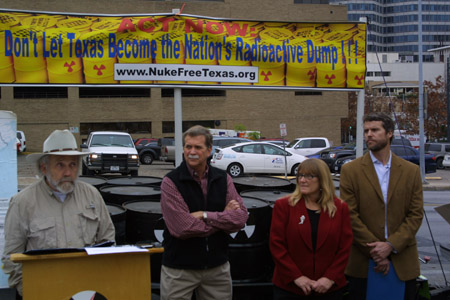
AUSTIN – Standing in front of a trailer full of black waste barrels representing radioactive waste, Public Citizen and the Sustainable Energy and Economic Development (SEED) Coalition today detailed a slew of problems associated with a plan to ship radioactive waste from 36 states into Texas.
"Texas radioactive waste commissioners are considering new rules that could allow Texas to become the nation’s radioactive waste dumping ground. The volume of waste transported, imported and stored could go up as much as 19 times," said Tom "Smitty" Smith, director of Public Citizen’s Texas office. "Our state law was designed to protect us from taking waste from many states. However, if these rules are changed, generators from all over the country can petition to send their waste to Texas if the commissioners approve the importation. Texans could get stuck paying billions to clean up the mess left behind."
The event was designed to raise awareness about the dangers of hauling so much radioactive waste through Texas towns by truck and rail. While routes are not yet designated, potential routes would take waste from the Gulf Coast area on Interstate 10 through Houston and San Antonio; waste from southern states would be trucked on I-20 and I-30 though Dallas and Forth Worth; Midwestern and Northeastern waste would be driven on I-40 and I-27 though Lubbock and Amarillo; and waste from Western states would be driven though the cities of El Paso and Odessa taking I-10 and I-20, according to Martin Resnikoff of Radioactive Waste Management Associates.
On Aug. 24, 2001, it was revealed that a 22-ton shipment of waste from an Illinois gaseous diffusion plant headed for Andrews, Texas, was lost for nearly a month. It was later found dumped on a North Texas cattle ranch near Oklahoma, piled on plastic and covered with dirt.
"Truck crashes occur all the time on our highways," Smith said. "This plan would dramatically increase the amount of radioactive waste traveling through our communities. We believe that if people know what is at stake, they will contact state officials and demand that the compact commission drop the proposal."
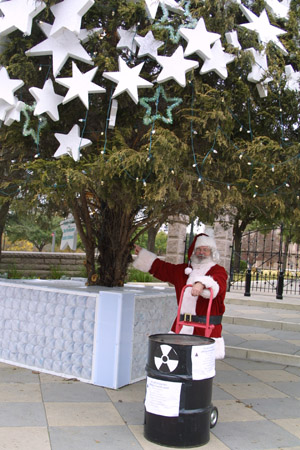
Nuclear Regulatory Commission (NRC) rules provide that class "A" wastes can be shipped in so-called "strong tight containers," barrels that do not have to pass any integrity test. About 10 percent of these containers that have been involved in accidents have failed. Of those, about 90 percent have released their contents, according to the NRC.
Under a 2003 agreement, a dump in Andrews County was designated to take radioactive waste from just Texas and Vermont. Now, the Texas Low Level Radioactive Waste Disposal Compact Commission is proposing to allow the importation of low-level radioactive waste from 36 states that don’t have anywhere to ship it.
The proposed dump would be operated by Waste Control Specialists (WCS), which is owned by Simmons, a politically powerful Republican who helped bankroll the Swift Boat attacks on Sen. John Kerry and who, according to Texans for Public Justice, has given Texas Gov. Rick Perry $1.12 million over the past decade, including $500,000 in 2010, making Simmons the No. 2 all-time individual donor to the governor.
The commission proposed rules earlier this year for such an expansion but withdrew them after receiving more than 3,000 comments from the public, most of them adamantly opposed to importation. On Nov. 3, the morning after the elections, the commission announced the rules would be re-posted with only minor changes. Citizens have until Sunday to submit comments.
"This looks like a Christmas present for a major donor," said Karen Hadden, director of the SEED Coalition. "Would Waste Control Specialists be able to expand so greatly if its owner wasn’t so politically connected? We suspect not."
"This is a blatant attempt to get these rules through while the public is busy with the holidays," Hadden added. "The commission should postpone these rules until both the Texas and Vermont legislatures – and the incoming Vermont governor – can consider the matter. Building a national nuclear waste dump in Texas violates the intent of the original Texas-Vermont agreement, which would limit the waste and raises a host of serious safety concerns that lawmakers need to consider."
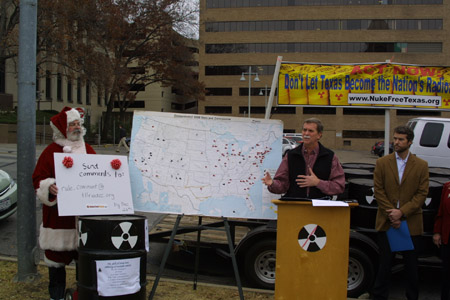
A primary concern for the Texas Legislature would be the state’s liability for the waste. Under state law, once the waste is accepted for disposal, the taxpayers – not WCS – are liable for any spills, seepage into the groundwater or other contamination. This could easily result in millions or even billions of dollars in liability for Texans – far more than the $136 million dollar bond posted by WCS for such problems. For example, the Western New York Nuclear Service Center in West Valley, N.Y., could cost $9.9 billion or more to clean up, according to an analysis by Synapse Energy.
The staff who reviewed the permit at the Texas Commission on Environmental Quality (TCEQ) unanimously recommended against granting a license for a low-level radioactive waste dump. In an interoffice memo, TCEQ technical staff said that it was "highly likely" that radioactive waste would leak into groundwater. Several quit in protest when their recommendations went unheeded by then-Executive Director Glenn Shankle and the facility was licensed anyway. Shankle went on to work for Simmons as a lobbyist, representing WCS just six months after leaving the TCEQ.
Risks of groundwater contamination are a significant concern. Maps have been in flux while a hot debate centers on whether the WCS site is connected to the Ogallala, a huge aquifer that provides drinking water for nearly two million people and extends beneath eight states, also supplying water for more than a quarter of the country’s irrigated land.
"People have to understand that this is their last shot to block a national radioactive waste dump from being built in Texas, with all the dangers that come with that," Smith said. "We urge Texans to send comments and ask the commission to push the pause button on this proposal until such time as the legislature has a chance to look at the risks from an accident or from a leak. This proposal is being railroaded through the process before the fiscally conservative Texas Legislature recognizes what a giveaway this is."
Instructions and suggestions for comments are available at http://www.TexasNuclearSafety.org .
All photos courtesy of Andy Wilson.
###
Public Citizen is a national, nonprofit consumer advocacy organization based in Washington, D.C., with an office in Austin, Texas.
The Sustainable Energy and Economic Development Coalition is working for Clean Air and Clean Energy in Texas
Texans Say No to Importing Radioactive Waste From Around the Country; Comments Accepted Until Dec. 26th
December 10, 2010
Media Release – For Immediate Release
Download this press release in pdf format for printing.
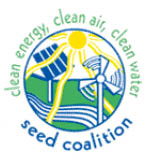
Contacts: Karen Hadden, Executive Director, SEED Coalition, 512-797-8481
Tom "Smitty" Smith, Director of Public Citizen’s Texas office, 512-637-9455
Austin, TX The only hearing on a proposed radioactive waste rule that would open Texas up to becoming the nation’s radioactive waste dumping ground was held yesterday in Austin. The rule would let waste from around the country go to Waste Control Specialists’ Andrews County site in West Texas instead of limiting waste to the Compact states of Texas and Vermont.
The Import Rule 30-day public comment period ends Dec. 26th so comments can still be sent to rule.comment@tllrwdcc.org.
A videotape of the Dec. 9th hearing will be online at http://www.texasadmin.com/tceqs.shtml and more information is available at www.NukeFreeTexas.org.
Speakers requested:
- a comment period extension
- that the vote be postponed until the legislature can examine Texas’ financial risks and ability to respond to accidents or contamination.
- that hearings be held in all major Texas cities since radioactive waste could travel down highways throughout the state and
- that Compact Commissioners to vote no to bringing in more radioactive waste.
"Many people are concerned that more radioactive waste means increased financial, health, environmental and security risks," said SEED Coalition Director Karen Hadden “They spoke of broken promises, environmental justice, protecting the land they love and preventing radioactive contamination of water. Some questioned whether anything prevents contamination of the Ogallala Aquifer that lies beneath eight states in the breadbasket region of the nation.”
Speakers included Craig Adair from Rep. Lon Burnam’s office, who brought a letter signed by fifteen House members. Farmers, ranchers, academics, scientists, artists, environmentalists and health advocates participated, coming from as far away as Dallas and Houston. One woman spoke on behalf of farming families in West Texas. Participants represented the League of Women Voters of Texas, NAACP, Texans for Public Justice, Environment Texas, Austin Center for Peace and Justice, SEED Coalition, Public Citizen, Lone Star Sierra Club, and Save Our Springs.
Nuclear reactor vessels, "poison curtains" that absorb reactor core radioactivity, and radioactive sludges and resins could all be sent to the West Texas site. No radionuclide would be excluded. Exposure to radioactive materials can cause cancer, birth defects, reduced immunity and even death, depending on the type of radioactive material and the level of exposure.
###
Comanche Peak Nuclear Reactors Opposed
October 21, 2010
Media Release

Oral Argument Oct. 28th In Granbury, Texas
Download this press release in pdf format for printing
Contacts: Karen Hadden, SEED Coalition, 512-797-8481
David Power, Public Citizen, Energy Expert 830-660-7557
Robert V. Eye, Attorney, 785-234-4040
Granbury, Texas Opponents of two proposed Comanche nuclear reactors will present their case at an Atomic Safety and Licensing Board (ASLB) panel on Oct. 28th. The hearing will begin at 9 a.m. in the Hood County Justice Center, 1200 West Pearl St. in Granbury.
Attorney Bob Eye will represent SEED Coalition, Public Citizen and the Ft. Worth based True Cost of Nukes organization. Among the concerns that will be raised in the Combined License (COL) proceeding is the failure of Luminant to analyze cleaner, cheaper and safer energy alternatives in their license application, a glaring omission considering that Luminant and Shell are exploring compressed air energy storage. "Today Texas has excess energy capacity and leads the nation in wind generation. Solar costs are plummeting. Energy storage and cheap gas can be used to back up renewable solar and wind power. The proposed reactors are a hazard to our health, safety and our pocketbooks," said energy expert David Power, who submitted a report regarding DEIS contentions.
Six new contentions based on the Draft Environmental Impact Statement (DEIS) were filed in September. They include concerns that the DEIS analysis of the need for power is flawed, that the carbon emissions analysis is distorted, that global warming impacts are understated, that reactor cooling ability could be impacted by higher water temperatures, and that wind and solar were not adequately considered as alternatives to nuclear power.
"Radioactive waste, safety and security issues, economics and the vast consumption of water are all reasons to avoid more nuclear reactors," said Karen Hadden, Executive Director of SEED Coalition. "The water level at Lake Granbury would drop which is of great concern to many local citizens."
"Nuclear power is the most expensive way to generate electricity. The proposed Comanche Peak reactors could reach $22 billion or more, roughly equal to the budget shortfall for the entire state of Texas. This is before cost overruns from delays and construction problems and the added costs of radioactive waste disposal and decommissioning. Nuclear reactors don’t make sense financially," said Karen Hadden, Director of the Sustainable Energy and Economic Development (SEED) Coalition.
"Constellation Energy just withdrew their license application for a Maryland nuclear reactor due to high costs. Ruminant’s parent company, Energy Future Holdings, has been struggling financially, and shouldn’t even consider taking on extensive additional debt, which is sure to result in skyrocketing electric bills and could result in the collapse of the company," said Hadden.
The Electric Reliability Council of Texas (ERCOT) 2009 State of the Market report says "Estimated net revenues for nuclear and coal resources were also insufficient to support new entry in 2009."
The Associated Press recently reported, "Even companies that are finalists for federal loan guarantees, NRG Energy and Constellation Energy, announced recently that they have nearly stopped spending on their projects… Analysts say low natural gas prices are making the project uneconomic. NRG chief executive David Crane said he will not pursue the company’s two-reactor project in South Texas if gas prices stay low, even if his project is offered a loan guarantee."
The ASLB is the independent body within the NRC that presides over proceedings involving the licensing of civilian nuclear facilities, such as nuclear power plants.
The Oct. 28th oral hearing is open for public observation, but participation will be limited to the parties admitted to the proceeding – NRC staff, the public interest groups, and Luminant, the applicant.
###
Experts: No Good Candidates Exist For Current Nuclear Reactor Loan Guarantee Bailout Funds, Much Less Tripled Amount Under Obama Budget Plan
February 3, 2010
"Ugly" Field of Four Bailout Candidates Present Huge Taxpayer Risks With Rising Cost Estimates, Delays, Flawed Reactor Designs, and Credit Downgrades; January One of Worst Months Ever for Industry.
Download this press release in pdf format for printing.
WASHINGTON, D.C.// What if the federal government held a beauty contest for taxpayer-backed nuclear reactor loan guarantee bailouts … and no reactor project "beauties" could be lined up for the runway?
According to experts from around the United States, that is precisely the situation the U.S. Department of Energy (DOE) faces today with the extraordinarily weak crop of four reactor project candidates vying for loan-guarantee bailouts. The four proposed projects at the top of the list for $18.5 billion in federal bailout support are: the Southern Company’s Vogtle reactors in Georgia (widely believed to be the current front runner); the NRG reactor project in Texas; the VC Summer reactors in South Carolina; and the Calvert Cliffs reactor in Maryland.
The local experts are far from being alone in their negative assessment of the viability of the four bailout candidates. According to the independent Taxpayers for Common Sense, the four finalists all exhibit some combination of "rising cost estimates, delays related to reactor designs, and credit downgrades." Making matters even worse: The four deeply flawed reactor projects are reputed to be the best of the options available, which means that there are no viable candidates in the pipeline to justify the tripling to $54 billion in nuclear reactor bailouts proposed under the White House budget released this week.
This is the latest bad news for the setback-plagued nuclear power industry, which is coming off of one of its worst months ever in January 2010, including: a major court room squabble between NRG and the City of San Antonio over a surprise $4 billion estimated cost increase for two proposed reactors in Texas; the rejection of $1 billion in rate increases by Florida regulators that has caused the two state utilities to announce a slowdown on their nuclear projects; and a growing scandal in Vermont over carcinogenic tritium leaks into the water supply that threaten to derail state approval of the extension of the Vermont Yankee reactor.
Sara Barczak, a program director with the Southern Alliance for Clean Energy, addressing the proposed Vogtle reactors in Georgia, said:
"It is difficult to fathom how the Vogtle project, which was a poster child for cost overruns in the original nuclear ‘boom’ and bust in the United States, could be the front runner for taxpayer-backed loan guarantee bailouts. Vogtle’s proposed Westinghouse AP1000 reactor design is not even approved by the Nuclear Regulatory Commission as safe from hurricanes, tornadoes and earthquakes. In fact, even if Vogtle got the loan guarantee go-ahead tomorrow, it could still face years of costly delays in order to make the reactor design safe or to gain license approval. This situation puts taxpayers squarely behind the eight ball in terms of increased risk from the very outset."
Barczak continued:
"The bottom line here is that extremely powerful and financially savvy utilities, such as the Southern Company, have already found a way at the state level to shift the risk to those who can least afford to pay for costly new reactors and now they’re hoping for even more handouts — this time at the expense of the U.S. taxpayer. How much more burden can be piled on to the shoulders of hard working families and small businesses in Georgia?"
Karen Hadden, executive director of the Sustainable Energy and Economic Development (SEED) Coalition, addressing the embattled NRG reactor project in Texas, said:
"The fact that NRG’s South Texas Project is considered a leading candidate for loan guarantees shows just how flawed the selection process is. This project may very well be doomed at this point, given the enormous recent cost increase of $4 billion that was kept from the San Antonio City Council, and the resulting legal wrangling between the utilities proposing to build the project."
Hadden continued:
"The South Texas Project is a perfect example of how the hope of loan guarantees is the only thing propping up reactors that otherwise would not be built. Even with the loan guarantees, the San Antonio City Council has signaled to their municipal utility that ratepayers can’t afford the increasingly expensive energy from the reactor. NRG said they would not proceed with the reactor without the loan guarantees. If anyone can explain why sinking billions of taxpayer dollars into such a risky project makes any sense at all, it would be interesting to hear it!"
Tom Clements, Friends of the Earth, addressing the proposed VC Summer reactors in South Carolina, said:
"The VC Summer project is ripe for major delays and huge cost overruns. The NRC has confirmed that the AP1000 reactor design as currently being reviewed is not ‘certified’ safe, contrary to claims by the utility SCE&G. Key reactor components, including the reactor pressure vessel, will have to be made overseas, and 90 percent of the uranium for fuel would come from foreign sources, belying the notion of ‘home-grown power,’ as is now incorrectly being touted by some SC politicians. The approval by the South Carolina Public Service Commission (PSC) for the project in February 2009 and the law forcing rate payers to pay in advance (even if the project fails) is being challenged by Friends of the Earth before the SC Supreme Court, with a hearing likely in March 2010."
Clements added:
"SCE&G, which is a small utility with limited assets, has low-balled the reactor cost, still claiming that its 55 percent share of two units would include a gross construction cost of about $6.3 billion, for a total cost of about $11.5 billion for the two units, well below the estimated cost of other reactor projects. SCE&G has admitted in quarterly filings with the SC PSC that the cost had at one point increased $500 million. The PSC made it clear in a January 2010 ruling that, although it allowed an 18-month construction delay in its original decision, it will restart the delay clock every time SCE&G requests a new schedule for construction milestones. This, coupled with an almost-certain delay in issuance of a license by the NRC, is a warning sign that the project is facing great schedule and cost uncertainty."
Michael Mariotte, executive director, Nuclear Information and Resource Service, addressing the proposed Calvert Cliffs reactor in Maryland, said:
"The proposed EPR reactor at Calvert Cliffs is the most expensive reactor design ever put forward for the U.S. Constellation Energy admits costs of $10 billion (not including financing) for Calvert Cliffs, whereas PPL Electric Utility projects a cost of $13-15 billion, including financing, for an identical reactor in Pennsylvania. PPL’s estimate works out to approximately $9,000 per kilowatt-about double the cost of wind power along Maryland’s Atlantic coast."
Mariotte added:
"Serious questions remain about the unprecedented level of foreign involvement in Calvert Cliffs. UniStar Nuclear is a 50/50 project of Constellation Energy and the French utility, Electricite de France (EdF). EdF is the largest single shareholder of Constellation (about 9 percent) and has recently purchased 49.9 percent of Constellation’s existing reactors. Most of the construction money will go to EPR manufacturer Areva. Both EdF and Areva are 85 percent or more owned by the French government. UniStar Nuclear hopes to complement the loan guarantee with financing from the French government’s Export-Import Bank. The NRC Commissioners have ordered that hearings on the foreign involvement issue be held before an Atomic Safety and Licensing Board. This foreign control is pertinent since Areva’s first EPR construction – Olikulioto-3 in Finland – is well over three years behind schedule and 75 percent over budget. The second EPR, being built by EdF at Flamanville, France, is at least 20 percent over budget after only two years of construction."
BACKGROUND INFORMATION: OPPOSITION TO THE NUCLEAR BAILOUT
Widespread opposition has emerged to proposals to award currently authorized taxpayer-backed loan guarantee bailouts, as well as President Obama’s proposed $54 billion tripling of such bailouts.
As the Center for American Progress pointed out yesterday:
"One down side of the president’s budget is that it includes a misguided expansion of nuclear loan guarantees. The Obama administration proposes to triple funds for nuclear loan guarantees from $18.5 billion to $54 billion. This huge growth exposes taxpayers to billions of dollars of potential liability if the nuclear debtors default on their loans. The Congressional Budget Office found that nuclear investments are very risky, stating, ‘CBO considers the risk of default on such a loan guarantee to be very high-well above 50 percent.’ Even if this risk factor is cut in half, one in four nuclear power plants would default on their loans due to cost overruns or other factors, leaving taxpayers to pick up the tab. And there are already indications that this could occur. Taxpayers for Common Sense found that none of the four "top-tier" project proposals for the existing loan guarantee program inspire confidence. All have "rising cost estimates, delays related to reactor designs, and credit downgrades." The proposed tripling of the nuclear loan guarantee program burdens taxpayers with additional financial risk."
In a Monday article titled Obama’s nuclear loan guarantees draw opposition, USA Today wrote:
"In a letter to Obama, four groups — the National Taxpayers Union, Taxpayers for Common Sense, the George Marshall Institute and the Non-Proliferation Policy Education Center — oppose an expansion of loan guarantees for new nuclear plants: ‘With hundreds of billions in bailouts already on the shoulders of U.S. taxpayers, the country cannot afford to move forward with a program that could easily become the black hole for hundreds of billions more.’ …
At the conservative Heritage Foundation, David Kreutzer, a senior policy analyst in energy economic and climate change, warned against expanding loan guarantees in a recent post: ‘This authorized $18.5 billion in loan guarantees will help build a handful of new nuclear reactors but any expansion of subsidies, tax credits or loan guarantees is a bad idea for taxpayers, consumers and long-term industry competitiveness. Continuing subsidies reduce the incentive to contain costs, create government dependence and stifle competition and technological development within the nuclear energy industry.
Another scholar, economist Dr. Mark Cooper at the Institute for Energy and the Environment at Vermont Law School, authored a report in June that found it would cost $1.9 trillion to $4.1 trillion more over the life of 100 new nuclear reactors than it would to generate the same electricity from a combination of more energy efficiency and renewables.
Peter Bradford, a former member of the Nuclear Regulatory Commission, writes …: ‘Of 26 new nuclear reactor license applications submitted to the Nuclear Regulatory Commission since 2007, nine have been canceled or suspended indefinitely in the last 10 months. Ten more have been delayed by one to five years. The Tennessee Valley Authority has canceled plans to revive a partially built unit.’"
For additional background on the huge risks facing U.S. taxpayers from increased loan-guarantee bailouts for the nuclear power industry, see tinyurl.com/yzdm6f6 and www.cleanenergy.org/index.php?/Press-Update.html?form_id=8&item_id=155.
CONTACT: Leslie Anderson, (703) 276-3256 or landerson@hastingsgroup.com.
EDITOR’S NOTE: A streaming audio recording of the news event will be available on the Web as of 5 p.m. EST on February 3, 2010 at www.cleanenergy.org/index.php?/Podcasts.html.
Protect Texas from Becoming Nation’s Radioactive Waste Dump
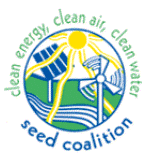
For Immediate Release:
January 22, 2010
Contact:
Karen Hadden, SEED Coalition, 512-797-8481
State Representative Lon Burnam Asks Tough Questions of Compact Commission
Austin, TX Today State Representative Lon Burnam (District 90, Ft. Worth) called on the Texas Low-Level Radioactive Waste Disposal Compact Commission to answer tough questions regarding their proposed rule that would open Texas up to becoming the nation’s radioactive waste dump. The Compact includes only the states of Texas and Vermont, but the draft import/export rule that is prime on today’s agenda essentially invites with open arms radioactive waste from the rest of the country and possibly the world. The waste would go to a site in Andrews County in West Texas that is owned by Waste Control Specialists (WCS).
“Turning Texas into the nation’s radioactive dumping ground so that WCS can make billions of dollars is irresponsible, especially since it will endanger public health and vital groundwater resources for thousands of years to come” said Representative Burnam. “Strong controls must be adopted now.”
“The Compact was formed to manage low-level radioactive waste generated in the Compact states, Texas and Vermont, so why is the Commission developing rules to import waste from around the country?” asked Representative Burnam, as he began with ten hard-hitting questions regarding the draft rule.
Texas and Vermont, the only two Compact parties, have expressed a need to dispose of at least 6 million cubic feet of radioactive waste in the next 50 years. Yet this volume, estimated by the Texas Compact Commission, is nearly three times more than the capacity of the site.
“If the Commission develops a rule for import, isn’t the Commission making the explicit assumption that the capacity of the site will be expanded and that the license will be amended for expansion? How can the Commission make such an assumption without a technical review of the site?” inquired Representative Burnam. He expressed concerns as to how the Commission can reconcile the discrepancy between Texas and Vermont’s estimated disposal needs and the stated capacity of site.
The State of Texas becomes liable for radioactive waste as soon as it comes across the border into our state and nuclear energy expert Dr. Arjun Makhijani has stated that increased environmental impacts would result from importing radioactive waste from outside of the Compact. Leaks from the dump site could lead to health threatening radioactive contamination. With significant potential impacts the rule should be considered a ‘major environmental rule’ and Burnam inquired as to why the Commission has not deemed it so, and then asked, “Why does the Commission not discuss the liability implications for Texas resulting from the import rule?”
Representative Burnam and safe energy advocates are calling on the Compact Commission to exercise its power and authority to protect and promote the “health, safety and welfare” of Texans as the law requires. The Commission should not allow waste to be imported from outside Texas and Vermont and should prevent Texas becoming the nation’s radioactive waste dumping ground.
The Compact meeting will be streamed live at: www.house.state.tx.us/fx/av/live/extlivecmte24.ram
Representative Burnam’s ten questions, SEED Coalition’s Comments on the draft rule, and supporting expert analysis are available online at www.nukefreetexas.org. SEED Coalition’s comments are endorsed by Public Citizen, Environment Texas, Nuclear Information and Resource Service, WE CAN, No Bonds for Billionaires and the South Texas Association for Responsible Energy.


